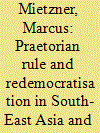| Srl | Item |
| 1 |
ID:
121665


|
|
|
|
|
| Publication |
2013.
|
| Summary/Abstract |
Indonesia is an almost ideal case study to test a variety of explanatory propositions for the rise and fall of military regimes. Over the course of 50 years, Indonesia has witnessed a military takeover, the consolidation of praetorian rule, the toppling of a military-backed autocrat and the marginalisation of the armed forces from politics after democracy took hold. The analysis of these four periods delivers important insights into the conditions under which countries fall victim to military coups and subsequently fail or succeed in their efforts of redemocratisation. While historical, governmental, economic, international and military-internal factors are all at play, it is arguably the quality of civilian governance that has the greatest impact on a state's prospects of preventing military interventionism. In turn, the strength of civilian governments depends to a large extent on the existence of a solid democratic consensus against military rule; as the Indonesian case shows, the absence of such intra-civilian agreements delivers ample opportunities to military officers to meddle in political affairs.
|
|
|
|
|
|
|
|
|
|
|
|
|
|
|
|
| 2 |
ID:
125169


|
|
|
|
|
| Publication |
2013.
|
| Summary/Abstract |
Three years ago, the Arab people rose up to demand bread, dignity, and freedom. While reactionary forces have proven resilient, there is no going back to the old status quo.
|
|
|
|
|
|
|
|
|
|
|
|
|
|
|
|
| 3 |
ID:
105441


|
|
|
|
|
| Publication |
2011.
|
| Summary/Abstract |
This article explores the prospects for civilian governance over Pakistan's military in the policy-relevant future. After reviewing the Pakistan army's past interference in the country's judicial and political affairs, it turns to the ongoing political maneuvering of the current Chief of Army Staff, General Ashfaq Parvez Kayani, despite Pakistan's ostensible democratic dispensation. The article dilates on the impact of US engagement on the robustness of the Pakistan army's dominance and questions the newfound US commitment to promoting democratization and civilian control. The article argues that while conventional wisdom places the onus disproportionately upon the military's penchant for interventionism, the army has intervened only with the active assistance of civilian institutions, which are subsequently further eroded with every military takeover. It concludes with a consideration of whether or not genuine civilian control would result in a significant change in Pakistan's foreign and domestic policies, particularly Pakistan's well-known utilization of Islamist militants in India and Afghanistan.
|
|
|
|
|
|
|
|
|
|
|
|
|
|
|
|